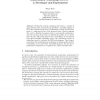Free Online Productivity Tools
i2Speak
i2Symbol
i2OCR
iTex2Img
iWeb2Print
iWeb2Shot
i2Type
iPdf2Split
iPdf2Merge
i2Bopomofo
i2Arabic
i2Style
i2Image
i2PDF
iLatex2Rtf
Sci2ools
141
Voted
IPPS
1999
IEEE
1999
IEEE
Coscheduling through Synchronized Scheduling Servers - A Prototype and Experiments
Predictable network computing still involves a number of open questions. One such question is providing a controlled amount of CPU time to distributed processes. Mechanisms to control the CPU share given to a single process have been proposed before. Directly applying this work to distributed programs leads to unacceptable performance, since the execution of processes on distributed machines is not coordinated in time. This paper discusses how coscheduling can be achieved with share-controlling scheduling servers. The performance impact of scheduling control is evaluated for BSP-style programs. These experiments show that synchronization mechanisms are indispensable and that coscheduling can be achieved for unmodi ed programs, but also that a performance overhead has to be paid for the control over CPU share.
CPU Share | CPU Time | Distributed And Parallel Computing | IPPS 1999 | Share-controlling Scheduling Servers |
| Added | 03 Aug 2010 |
| Updated | 03 Aug 2010 |
| Type | Conference |
| Year | 1999 |
| Where | IPPS |
| Authors | Holger Karl |
Comments (0)

